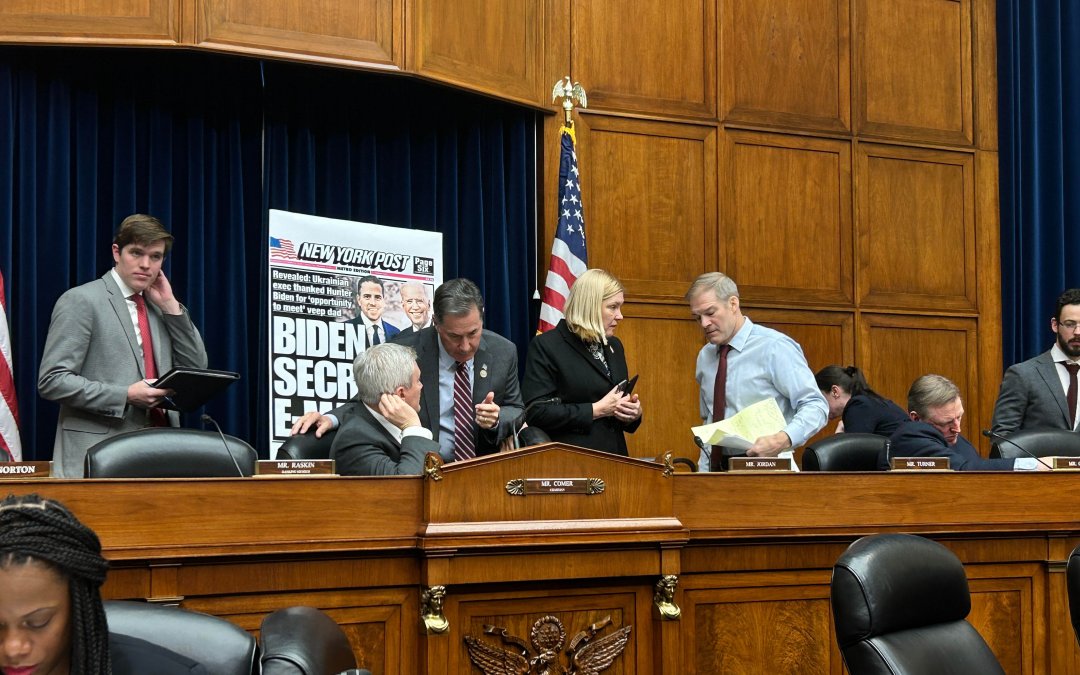WASHINGTON — The House Oversight Committee’s hearing on Wednesday over Twitter’s temporary suppression of an article about Hunter Biden’s laptop rapidly devolved into partisan fighting about First Amendment rights, claims of collusion between Twitter and the government, and the purview of the committee itself.
Members of the GOP have been stoking the fire of the laptop controversy and Hunter Biden’s business dealings since before the 2020 election. On Wednesday, they gathered four former high-ranking Twitter executives to grill them over the short-term removal of a controversial New York Post article about emails and images purportedly recovered from the laptop of President Joe Biden’s son Hunter.
Rep. James Comer (R-Ky.), chairman of the House Oversight Committee, asserted in his opening statement that Big Tech companies and media organizations “colluded to suppress and delegitimize information contained in Hunter Biden’s laptop about the Biden family’s business schemes.”
Witnesses were repeatedly made to wait over long stretches of time where they did not speak at all, as committee members from both parties bickered with one another and aired grievances about Twitter’s policies.
Rep. Marjorie Taylor Greene (R-Ga.,) whose own Twitter account was suspended in Jan. 2022 until Elon Musk bought the social media company, was particularly pointed in her criticisms.
“You can consider your speech canceled during my time because you canceled mine,” Greene said.
Greene then, without evidence, accused Twitter and its employees of collaborating with the CIA, FBI and federal government to “shadow ban conservative Americans and candidates like me, including former President of the United States Donald J. Trump.”
Rep. Alexandria Ocasio-Cortez (D-N.Y.) said to a reporter during a recess that the GOP members “have not even made any legal or legislative argument as to what the tie here is, beyond a personal offense,” referring to Greene’s ire at the ban of her own account.
The tone of the hearing was set early with a blown-up image of the New York Post headline BIDEN SECRET EMAILS, which sat behind Comer for the duration of the session.
Republicans framed the hearing as an essential check on targeted violations of the First Amendment purported by Twitter, while Democrats insisted that the entire thing was a ploy to draw negative attention to the Biden family.
“Republicans are on a taxpayer-funded expedition to attack their political rivals,” said Rep. Eleanor Holmes-Norton (D-D.C.). “And they are feeding the flames of conspiracy in the process.”
Other prominent Democrats on the committee asserted that no First Amendment violations were taking place.
“Twitter is a private media company,” ranking member Jamie Raskin (D-Md.) said in his opening statement. “In America, private media companies can decide what to publish or how to curate content however they want. Those decisions, however heroic or imbecilic you think they might be, are protected by the First Amendment in the United States of America.”
Director of the Free Speech Center at Middle Tennessee State University and former USA Today editor-in-chief Ken Paulson simplified the best way to fact-check assertions about the First Amendment: “If you deal with any First Amendment issue, you have to ask two questions to determine if the First Amendment is being violated. The first is, ‘Is the government involved at any level?’ And two is, ‘Is there expression?’”
“In the case of Twitter and other social media platforms, these are private companies that have every right to run their business as they choose to,” Paulson concluded.
Rep. Nancy Mace (R-S.C.) said she vehemently disagreed with Twitter’s decision to “blacklist” Stanford medical professor Jay Bhattacharya, whose controversial advocacy for herd immunity over mass vaccination led to pushback from the World Health Organization.
Mace used Bhattacharya and Martin Kulldorff, a Harvard medical professor and co-author of the herd immunity declaration, as examples of how the platform was suppressing contrarian ideas about how to fight the COVID-19 pandemic. She claims to suffer from persistent health issues after receiving the COVID vaccine.
“Thank God for Elon Musk,” said Mace, “for showing us and the world that Twitter was basically a subsidiary of the FBI.”
Paulson has a different view. “Elon Musk is trying to position himself as a free speech hero. But he’s not building a marketplace of ideas. It’s a cesspool that victimizes users and undermines the free flow of information.”
Republican committee members often shifted to topics outside the original scope of the hearing.
Greene singled out one of the witnesses, Yoel Roth, Twitter’s former global head of trust and safety. She mischaracterized his doctoral dissertation as an argument that minors should have access to Grindr, a gay dating app, and discussed Roth’s position in tandem with Twitter’s failure to remove child pornography from the site.
Rep. Robert Garcia (D-Calif.) later apologized to Roth for what he called a “really shameful” “homophobic rant” from Greene.
Other legal experts also disagreed with some members’ assertion that conservative Twitter users were having their rights violated by the platform.
“I think it shows a fundamental misunderstanding of what the First Amendment covers and doesn’t cover,” said Rob Frieden, emeritus professor of telecommunications and law at Penn State.
“For every liberal-leaning social media, there’s a right-wing alternative, and it’s not as if speech is being suppressed,” Frieden said. “They’re using their bully pulpit of investigatory powers, basically, to showboat.”
Rep. Maxwell Frost (D-Fla.) echoed that position, saying that Republicans “often conflate the right to free speech with the nonexistent right to not be criticized or held accountable for what you say on the internet, or even in real life.”


